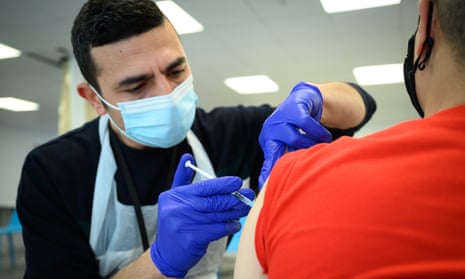Covid booster shots can dramatically strengthen the body’s immune defences, according to a study that raises hopes of preventing another wave of severe disease driven by the Omicron variant.
In a study published in the Lancet, researchers on the UK-based Cov-Boost trial measured immune responses in nearly 3,000 people who received one of seven Covid-19 boosters or a control jab two to three months after their second dose of either AstraZeneca or Pfizer vaccine.
Those boosted with Pfizer after two doses of AstraZeneca had antibody levels a month later nearly 25 times higher than controls. When the Pfizer booster was given following two Pfizer shots, antibody levels rose more than eightfold.
The most potent booster in the study was a full dose of the Moderna vaccine, which raised antibody levels 32-fold in the AstraZeneca group and 11-fold in the Pfizer group. When Moderna is used in the UK booster programme, it is given at a half-dose.
While the findings show that both Pfizer and Moderna mRNA vaccines are highly effective boosters, scientists cautioned about comparing their performance as people started with different antibody levels. For example, antibody levels tend to remain high a few months after a Pfizer vaccination, so a booster would not be able to drive them much higher.
“These are remarkably effective immunological boosters, way above what is needed to prevent hospitalisation and death,” said Prof Saul Faust, the trial lead and director of the NIHR clinical research facility at University Hospital Southampton NHS Foundation Trust. While side-effects varied, most people who reported them had fatigue, headache or arm pain and the study found no safety concerns.
Beyond antibodies, the scientists looked at the impact of boosters on T-cells – another crucial component of the immune system linked with the prevention of severe disease. Most of the boosters, including Pfizer, Moderna and AstraZeneca, increased T-cell levels regardless of the vaccine people had for their first two doses.
One result that has caught scientists’ attention is that the T-cell response was as good against the Beta and Delta variants of concern as against the original virus that emerged from Wuhan. Asked if the finding might be relevant to the Omicron variant, Faust said: “Our hope as scientists is that protection against hospitalisation and death will remain intact.”
Jonathan Ball, professor of molecular virology at the University of Nottingham, who was not involved in the study, shared Faust’s optimism.
“Whilst variants, such as the Delta variant, reduced the overall virus-killing effect of antibodies, the T-cell responses were pretty much unaffected,” he said. “The fact that the mRNA vaccine boosts gave a marked increase in both antibodies and T-cells is great news, especially now, when our attention has been grabbed by the emergence of the Omicron variant.
“We still don’t know how this increase in immunity translates into protection, especially against serious disease, but I am still convinced that our vaccines will continue to provide the protection that we need.”
Early results from the Cov-Boost study underpinned the decision by the Joint Committee on Vaccination and Immunisation to shorten the time people had to wait for a booster from six to three months. The study found AstraZeneca to be an effective booster too, raising antibody levels three and five times after primary vaccination with AstraZeneca and Pfizer respectively.
Further results from the study suggest that booster programmes could switch to half-doses of the Pfizer vaccine without losing much protection. The data shows that half-doses of Pfizer boosted antibody levels in the AstraZeneca group nearly 17 times and more than six times in those who had Pfizer for their first two shots.
